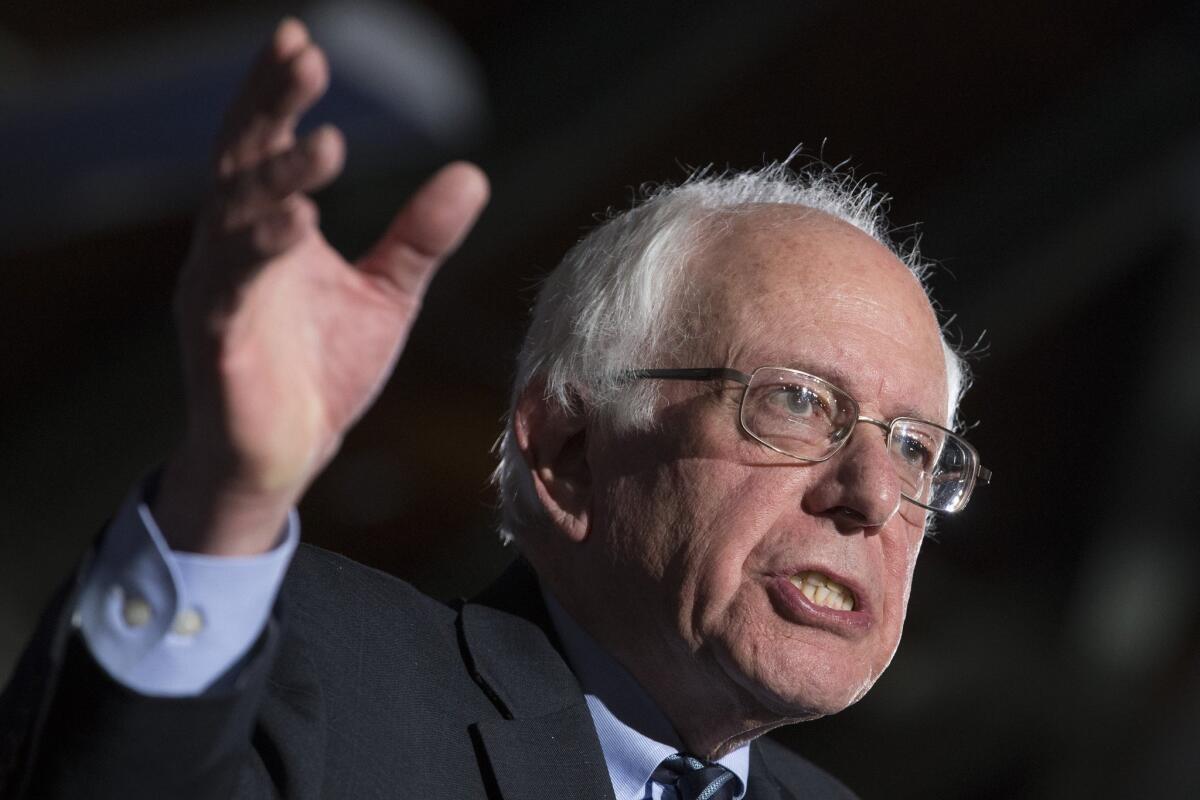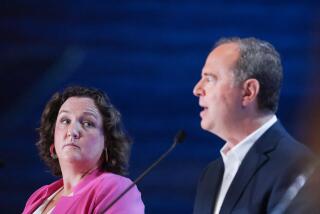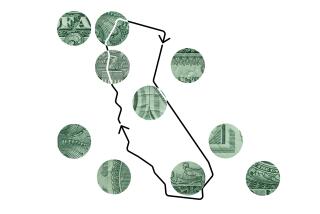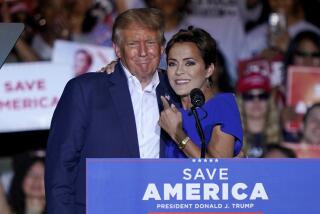Capitol Journal: Bernie Sanders blazes a trail to the root of political evils

Sen. Bernie Sanders (I-Vt.) has turned the topic of high-roller campaign financing into a centerpiece of his presidential campaign.
Whether he’s your candidate or not, give Bernie Sanders credit: He has made inherently corrupt, high-roller campaign financing a central issue of his presidential bid.
“Bernie definitely has blazed a trail,” says Derek Cressman, a California-based political reformer. “No presidential candidate has ever made it a centerpiece of his campaign the way he has.”
In 2000, Sen. John McCain of Arizona railed against so-called soft-money donations to political parties in his unsuccessful race for the Republican nomination, but he also had higher-priority issues.
Sanders, the independent senator from Vermont running for the Democratic nomination, has made fat-cat campaign money an integral part of his populist “rigged economy” message.
And it’s working. Although still the underdog, Sanders trounced Hillary Clinton in a New Hampshire landslide Tuesday after a razor-thin loss to her in Iowa.
Sounding a bit like Woody Guthrie intoning “this land is your land,” Sanders told supporters after the New Hampshire voting:
“We have sent a message that will echo from Wall Street to Washington, from Maine to California … that the government of our great country belongs to all of the people and not just a handful of wealthy campaign contributors and their super PACs.”
Exit polling showed that the personal quality mattering most to voters was whether a candidate was “honest and trustworthy.” And 92% of those who said that supported Sanders. Certainly the senator’s “honesty” image has been burnished by his campaigning against the unfair influence of mega-rich political donors.
The giving of large wads of campaign cash is, for my money, the root cause of virtually all evils in our political system.
Money may not always buy elections, but it indisputably influences legislation.
How much?
“We react more positively to our friends than we do to strangers,” says longtime Sacramento lobbyist George Steffes, who began his career leaning on lawmakers for Gov. Ronald Reagan. “That’s human. And one thing ‘friends’ of legislators do is support them.”
Labor friends and business friends. Teacher unions and oil companies.
It’s a reason education reform is so hard to enact in Sacramento — and why California is the only major petroleum-producing state without an oil-extraction tax.
Sanders put it this way in a New Hampshire debate with Clinton last week:
“Let’s talk about why, in the 1990s, Wall Street got deregulated. Did it have anything to do with the fact that Wall Street … spent billions of dollars on lobbying and campaign contributions?
“…. Let’s talk about climate change. Do you think there’s a reason why not one Republican has the guts to recognize that climate change is real and that we need to transform our energy system? Do you think it has anything to do with the Koch brothers and ExxonMobil pouring huge amounts of money into the political system?”
“…. And in my view, it is undermining American democracy.”
No muffled message there. No ducking or swerving.
Clinton should leap in, agree completely and cut him off. But maybe she’s leery of being accused of hypocrisy. Her candidacy benefited from $48 million in outside money last year, according to the Center for Responsive Politics.
Rather than joining Sanders in an anti-corruption chorus during the debate, Clinton got defensive.
“I really don’t think these kinds of attacks by insinuation are worthy of you,” she told him. “If you’ve got something to say, say it directly. But you will not find that I ever changed a view or a vote because of any donation.”
Maybe not. But plenty of politicians have.
Sanders proudly notes that he has not received any outside super PAC help.
The senator brags about the 3.7 million individual contributions, averaging $27, that he has received from 1 million people.
By contrast, Republican Jeb Bush benefited from $118.4 million in outside money last year, the politics center reported.
Correct that: He actually hasn’t benefited much. He’s barely surviving.
Republican front-runner Donald Trump also has not accepted super PAC money. But he’s a billionaire who can self-finance his campaign. Sanders isn’t.
Super PACs — political action committees — burst on the national scene after the U.S. Supreme Court’s 2010 decision favoring Citizens United, a conservative lobby. The court eliminated limits on outside spending by corporations, unions and nonprofits for political advertising.
“Five zealots on the court say the 1st Amendment forbids limiting the amount of money a billionaire like Charles Koch or Tom Steyer spends to promote his point of view,” Cressman says in his new book, “When Money Talks.”
“These five men in black robes say it is unconstitutional to prevent the super-rich from drowning out the voices of everyone else. These five men are wrong.”
Sanders repeatedly says he wants to “absolutely overturn” the court decision. Clinton agrees. But that would require a substantial change in the court.
The Citizens United decision has not affected California state elections. We already suffered the curse of so-called independent expenditure committees that can raise unlimited money so long as they don’t “coordinate” with the candidate. Yeah, right!
The real answer is complete public financing — the public buying the politicians instead of the special interests. But hardly anyone wants that: not the politicians, not the political profiteers, not the public.
Don’t misread me. I’m not saying Sanders should be president. But I am thankful he’s pointing out to voters the root cause of legal corruption in politics.
It’s a subject other candidates dread.
Twitter: @LATimesSkelton
More to Read
Start your day right
Sign up for Essential California for news, features and recommendations from the L.A. Times and beyond in your inbox six days a week.
You may occasionally receive promotional content from the Los Angeles Times.







